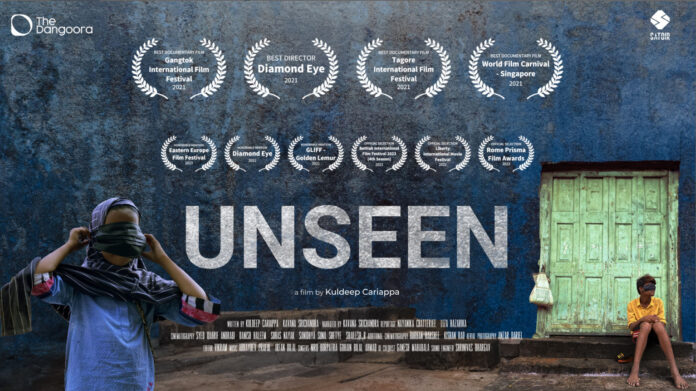The COVID-19 pandemic altered the way we see the world. But for many, it also revealed just how little we ever really saw in the first place. While middle-class families holed up in homes stocked with provisions, an entire underclass of people became invisible, caught in the no-man’s land between national policy and daily survival.
One person who refused to look away was filmmaker Kuldeep Cariappa. His documentary, UNSEEN, strips away the veneer of “flattening the curve” to reveal the pandemic’s harshest realities for India’s most marginalized populations. It’s a film about being left behind—quite literally—and yet, somehow finding a way to survive.
An Urgent Mission
In the early days of India’s lockdown, while many turned inward, Cariappa’s attention turned outward. “I knew I couldn’t sit at home and watch this happen,” he says. “The official narratives were all about the virus, but nobody was talking about the people who had no choice but to face the consequences of those decisions head-on.”
His initial inquiries into the lives of sex workers in Mumbai spiraled into a broader exploration of pandemic-era survival stories across India. UNSEEN captures the voices of sex workers in Kamatipura, the displaced in Assam, riot survivors in Delhi, and those living in the constant shadow of conflict in Kashmir.
But more than a journalistic exercise, the film feels like a moral obligation—a reckoning with what it means to live in a society that renders certain lives invisible, even when they’re right in front of us.
Invisible Forces at Play
The people at the heart of UNSEEN are no strangers to hardship. They belong to India’s invisible army—the migrant workers, the homeless, the sex workers, and riot survivors who live on the fringes of legality and recognition. Their struggles are often hidden beneath layers of societal apathy. But what happens when that fragile fabric holding them together is ripped apart by a nationwide lockdown?
In the film, a sex worker in Kamatipura describes her plight as the lockdown snatched away her means of income, leaving her at the mercy of hunger. “Who is going to help us? No one will touch us, no one wants to see us,” she says, her voice cracking with frustration and despair.
For the displaced workers in Assam, the pandemic was compounded by the environmental catastrophe of the Baghjan gas leak. What little they had was taken from them twice—once by disaster, and again by government negligence. In Delhi, riot survivors who had lost everything in early 2020 faced the grim reality of rebuilding their lives under a lockdown that offered no resources.
These stories are devastating, but they are also necessary. UNSEEN doesn’t shy away from the systemic failures that allowed these tragedies to occur. It critiques not just the pandemic response but the broader social structures that keep India’s most vulnerable in perpetual precarity.
Filmmaking as Activism
The documentary is, in many ways, a form of activism. Cariappa never set out to be an activist-filmmaker, but UNSEEN naturally evolved into a tool for raising awareness and demanding accountability. It is not just a film about poverty and suffering; it is a call to action.
“We can’t ignore the fact that we are complicit in the systems that marginalize these people,” Cariappa argues. He believes that by shedding light on these lives, the film can spark important conversations about policy, empathy, and civic responsibility. “I want people to see that this isn’t an isolated problem. It’s part of a larger, deeply rooted issue.”
With India’s government response facing criticism for its handling of both the pandemic and the crises within crises, UNSEEN serves as a timely reminder that the cost of these missteps is measured in human lives—lives that might be unseen by the powers that be, but that are all too real for those living them.
The Unseen Yet Universal
While rooted in India’s social landscape, UNSEEN also speaks to a global issue—the widening gap between the seen and unseen in times of crisis. The pandemic has disproportionately affected the poor and marginalized, not just in India but across the world.
By giving voice to those who fell through the cracks of public policy, the film forces viewers to confront uncomfortable truths about how societies prioritize whose lives matter most. It’s a film that transcends its geography, speaking to anyone who has ever wondered what happens to those who slip through the cracks.
More Than a Film, a Movement?
Though UNSEEN has drawn international praise, Cariappa remains focused on the issues it raises rather than the spotlight it has garnered. “The real success of this film will be if it pushes people to act, to see what they’ve been missing,” he says.
With UNSEEN now making its way through festivals and preparing for public release, the question remains: Will we see these stories, or will they once again slip back into obscurity? The hope, as Kuldeep Cariappa shows us, is that they won’t remain UNSEEN forever.
















